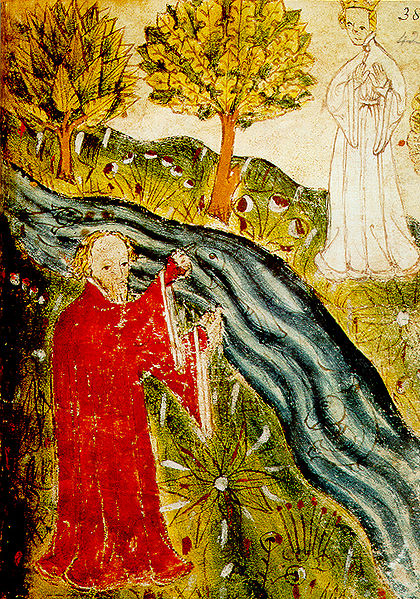Original Publication Date: late 14th century
Genre: poem
Topics: allegory, elegy
Review:
I hesitate to call this a "review," because honestly I understood very little of what was going on in this poem.
Pearl is by the same poet who wrote Sir Gawain and the Green Knight (or so the experts say), often called the Gawain Poet or the Pearl Poet. I read and loved Sir Gawain and the Green Knight (see my review at Medieval Bookworm), so I thought Pearl would be similarly enjoyable. It definitely is not a bad poem, just kind of impenetrable.
Pearl has been called one of the most complex poems in the English language, and no one really understands what it means. On the surface it's an elegy for the poet's daughter, but it's also an allegory with multiple layers of symbolism and intricate mathematical and alliterative patterns. Which sounds FASCINATING, and I can see why scholars would totally geek out over it; but as far as entertainment value to a typical modern reader? There's not much to latch onto here. Allegory isn't terribly popular these days; and while Sir Gawain and the Green Knight and The Faerie Queene (review here) both had allegory, at least they also had a story to keep one interested. Pearl mainly relies on a personification of spiritual and religious purity. Sigh. Of all allegorical devices, personification is quite possibly the worst.
As for Pearl being an elegy about the poet's dead daughter, I have my doubts about that. If it is about a real person, it's only in the most superficial way. Pearl is definitely a symbol, sometimes similar to the Virgin Mary, sometimes reminding me of Petrarch's Laura. If you're expecting some sort of emotional resonance, in other words, you're going to be disappointed.
If you read Dante's Divine Comedy and enjoyed the third book, Paradiso, then you'll probably get into Pearl. The two works share several elements, except Pearl is much shorter (possibly its only saving grace). For the average person, though, I think this poem is of limited interest. But you probably figured that out as soon as I said, "one of the most complex poems in the English language and no one really understands what it means," didn't you?
Read Pearl by the Gawain Poet on Librivox|Project Gutenberg
Genre: poem
Topics: allegory, elegy
Review:
I hesitate to call this a "review," because honestly I understood very little of what was going on in this poem.
Pearl is by the same poet who wrote Sir Gawain and the Green Knight (or so the experts say), often called the Gawain Poet or the Pearl Poet. I read and loved Sir Gawain and the Green Knight (see my review at Medieval Bookworm), so I thought Pearl would be similarly enjoyable. It definitely is not a bad poem, just kind of impenetrable.
Pearl has been called one of the most complex poems in the English language, and no one really understands what it means. On the surface it's an elegy for the poet's daughter, but it's also an allegory with multiple layers of symbolism and intricate mathematical and alliterative patterns. Which sounds FASCINATING, and I can see why scholars would totally geek out over it; but as far as entertainment value to a typical modern reader? There's not much to latch onto here. Allegory isn't terribly popular these days; and while Sir Gawain and the Green Knight and The Faerie Queene (review here) both had allegory, at least they also had a story to keep one interested. Pearl mainly relies on a personification of spiritual and religious purity. Sigh. Of all allegorical devices, personification is quite possibly the worst.
As for Pearl being an elegy about the poet's dead daughter, I have my doubts about that. If it is about a real person, it's only in the most superficial way. Pearl is definitely a symbol, sometimes similar to the Virgin Mary, sometimes reminding me of Petrarch's Laura. If you're expecting some sort of emotional resonance, in other words, you're going to be disappointed.
If you read Dante's Divine Comedy and enjoyed the third book, Paradiso, then you'll probably get into Pearl. The two works share several elements, except Pearl is much shorter (possibly its only saving grace). For the average person, though, I think this poem is of limited interest. But you probably figured that out as soon as I said, "one of the most complex poems in the English language and no one really understands what it means," didn't you?
Read Pearl by the Gawain Poet on Librivox|Project Gutenberg
